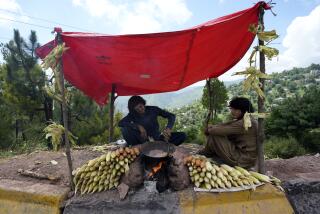IMF Approves $1-Billion Loan to Argentina
- Share via
WASHINGTON — The International Monetary Fund said Thursday that it has tentatively approved a $1.4-billion loan to Argentina, but there was no immediate indication whether the move would spark new lending by commercial banks, as historically has been the case.
The World Bank also announced Thursday that it will soon unlock about $1.5 billion in loans that were frozen earlier when Argentina’s last economic reform program began falling apart.
Michel Camdessus, the IMF’s managing director, said the IMF departed from its usual procedures and approved the Argentine program before receiving the traditional advance assurances from commercial banks that they would be making sizable amounts of new loans themselves.
Argentina is already $3.5 billion in arrears on loan repayments to commercial banks and needs the cash to finance imports while it puts its economic house in order. The country’s new president, Carlos Menem, met Wednesday with President Bush.
Banks Are Fed Up
But U.S. officials said it is not clear whether approval of a loan by the IMF would enable Argentina to attract several billion dollars in new loans from commercial banks, as has been the case previously during the Third World debt crisis, which started in late 1982.
American banks, already tired of lending to Third World governments, have served notice that they are unwilling to continue lending sizable amounts of new money to developing countries--particularly under a new Treasury plan that asks them to discount some debts.
The Administration has been trying to persuade the commercial banks to resume their lending to debtor countries, since bank lending constitutes the bulk of the new money that is needed for these countries to remain afloat.
President Bush met with about 30 bankers late Tuesday in what U.S. officials said was an effort to “keep the momentum going” on the question of providing new loans. He reinforced that message in a speech Wednesday before the IMF and the World Bank.
The World Bank’s decision to unlock the previously allocated $1.5 billion in loans was announced Thursday by bank President Barber B. Conable.
Frustrated by Plan
Conable said at a press conference that the World Bank would be “willing to follow with a series of” loans to finance reforms in specific sectors of Argentina’s economy--particularly finance, the streamlining of state-owned companies and trade-liberalization and deregulation.
But he indicated that he is seriously concerned about the prospect that commercial banks, frustrated with the new Treasury plan, might not follow through with loans of their own. “I hope President Bush doesn’t underestimate the unhappiness of the banks,” he said.
The IMF and World Bank are sister organizations set up by the Bretton Woods Agreement in 1944. The IMF’s focus is on lowering trade barriers and stabilizing currencies; the World Bank’s is on foreign exchange reserves and the balance of trade.
Both Camdessus and Conable were quick to heap praise on Menem, who--though elected on the populist Peronist platform--has moved promptly to embrace a series of belt-tightening measures designed to put Argentina’s economy in order.
However, U.S. analysts said that for all his current political strength Menem faces serious obstacles, such as the Italian-linked oligopoly that controls the business sector of the economy, which historically has opposed all such reforms.
The new Menem government is scheduled to publish details of its new economic reform programs in Buenos Aires next Friday. Menem is expected to slash government spending in Argentina and to seek to sell state-owned corporations to private buyers.
Approval of the IMF loan to Argentina came as the fund and the World Bank ended a four-day-long joint annual meeting that produced little of substance beyond the traditional array of bilateral meetings among finance ministers.
The organizations’ 152 member countries postponed until late this year or early in 1990 a decision on whether to increase the overall lending resources of the IMF, which now total $120 billion. The United States, in particular, questioned whether a increase is needed.
They also failed to get beyond preliminary negotiations on how much to raise the lending pool for the International Development Assn., a subsidiary of the World Bank that makes low-interest loans to poorer countries.
More to Read
Sign up for Essential California
The most important California stories and recommendations in your inbox every morning.
You may occasionally receive promotional content from the Los Angeles Times.













